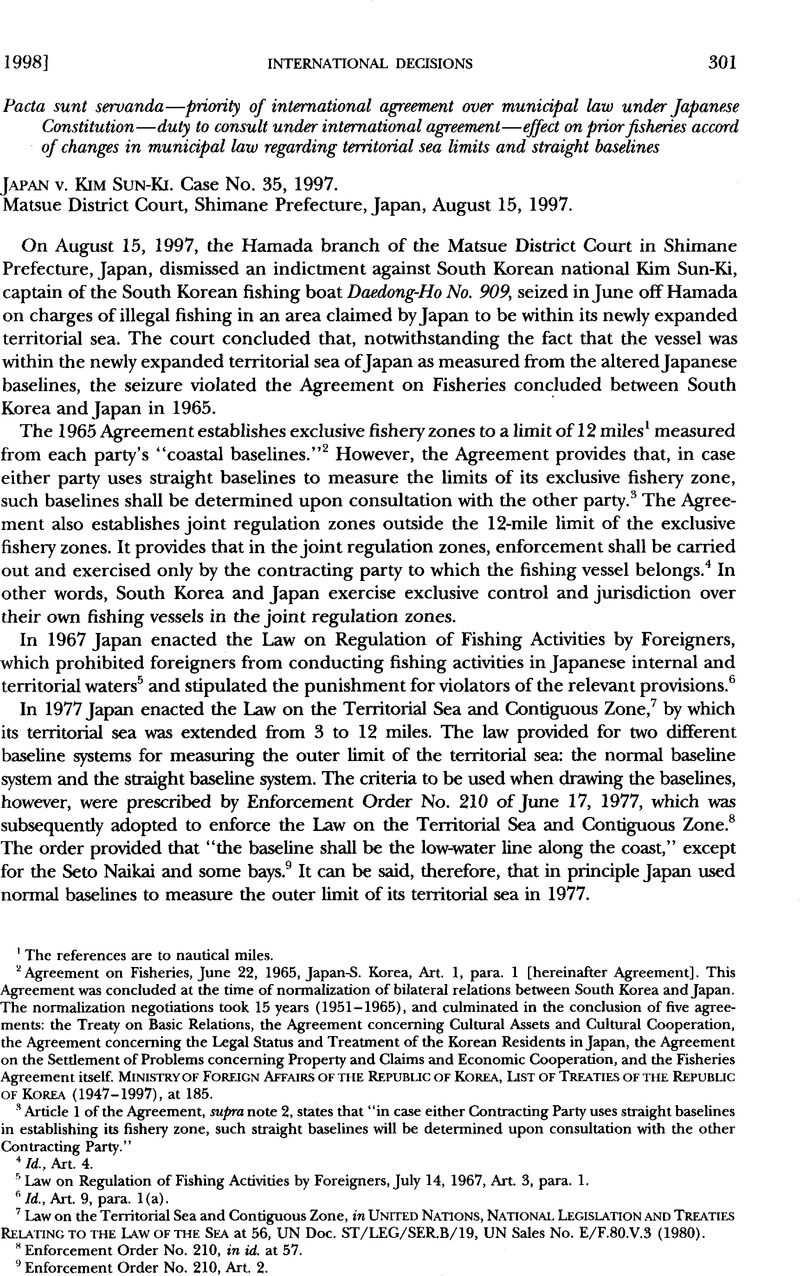No CrossRef data available.
Published online by Cambridge University Press: 27 February 2017

1 The references are to nautical miles.
2 Agreement on Fisheries, June 22, 1965, Japan-S. Korea, Art. 1, para. 1 [hereinafter Agreement]. This Agreement was concluded at the time of normalization of bilateral relations between South Korea and Japan. The normalization negotiations took 15 years (1951–1965), and culminated in the conclusion of five agreements: the Treaty on Basic Relations, the Agreement concerning Cultural Assets and Cultural Cooperation, the Agreement concerning the Legal Status and Treatment of the Korean Residents in Japan, the Agreement on the Settlement of Problems concerning Property and Claims and Economic Cooperation, and the Fisheries Agreement itself. Ministry of Foreign Affairs of the Republic of Korea, List of Treaties of the Republic of Korea (1947–1997), at 185.
3 Article 1 of the Agreement, supra note 2, states that “in case either Contracting Party uses straight baselines in establishing its fishery zone, such straight baselines will be determined upon consultation with the other Contracting Party.”
4 Id., Art. 4.
5 Law on Regulation of Fishing Activities by Foreigners, July 14, 1967, Art. 3, para. 1.
6 Id., Art. 9, para. 1(a).
7 Law on the Territorial Sea and Contiguous Zone, in United Nations, National Legislation and Treaties Relating to the Law of the Sea at 56, UN Doc. ST/LEG/SER.B/19, UN Sales No. E/F.80.V.3 (1980).
8 Enforcement Order No. 210, in id. at 57.
9 Enforcement Order No. 210, Art. 2.
10 Enforcement Order for the Law on the Territorial Sea and Contiguous Zone, No. 206 (July 5, 1996), Art. 2, paras. 1, 2.
11 See note 3 supra.
12 Revised Law on Territorial Sea and Contiguous Zone, Art. 2; revised Enforcement Order, supra note 10, Art. 2, para. 1.
13 Pleading at 3 (Aug. 1, 1997), Case 35.
14 Id. at 4.
15 See note 3 supra.
16 Agreement, supra note 2, Art. 4.
17 The flag state principle of jurisdiction stipulated in the Agreement reflects Japan’s deep concern at the time to relieve its own fishermen, who were then conducting active fishing operations outside the 12-mile limit of Korea’s exclusive fishing zone, of the threat of seizure by Korea. Choon-ho Park, East Asia and the Law of the Sea 67–68 (1983).
18 Case 35, Judgment, at 4 (author’s translation).
19 In a similar situation, the European Court of Justice found that the new baselines unilaterally drawn by the United Kingdom for measuring its territorial sea could not apply to the fisheries arrangements established by an agreement between the United Kingdom and the member states of the European Economic Community, on the ground that the effect of applying the new baselines excluded fishermen from member states concerned from areas in which they had fished legitimately under Council Regulation 170/83. Case C-146/89, Commission v. United Kingdom, 1991 ECR 1–3566, 100 ILR 115, 117.
20 Frederic, L. Kirgis Jr., Prior Consultation in International Law: A Study of State Practice 1 (1983)Google Scholar.
21 Id. at 3.
22 Park, note 17 supra, at 62–70.
23 In its Advisory Opinion on the Treatment of Polish Nationals in Danzig, the Permanent Court of International Justice found that
a State cannot adduce as against another State its own Constitution with a view to evading obligations incumbent upon it under international law or treaties in force. Applying these principles to the present case, it results that the question of the treatment of Polish nationals or other persons of Polish origin or speech must be settled exclusively on the bases of the rules of international law and the treaty provisions in force between Poland and Danzig.
1932 PCIJ (ser. A/B) No. 44, at 24 (Feb. 4) (emphasis added). See also Free Zones of Upper Savoy and the District of Gex, 1932 PCIJ (ser. A/B) No. 46, at 12–21 (June 7).
24 Vienna Convention on the Law of Treaties, opened for signature May 23, 1969, Art. 17, 1155 UNTS 331.
25 Iwasawa, Yuji, Effectuation of International Law in the Municipal Legal Order of Japan , 4 Asian Y.B. Int’l L. 143, 148–49 (1994)Google Scholar; see Kabushiki-Gaisha Iwasawa Shoten v. Japan Air Lines, 31 Minshū 511 (Sup. Ct, June 28, 1977), 23 Japanese, Ann. Int’l L. 174 (1979–80)Google Scholar.
26 Waldock, C. H. M., Disputed Sovereignty in the Falkland Islands Dependencies , 25 Brit. Y.B. Int’l L. 311, 312 (1948)Google Scholar.